#LONG SENTENCES
Text
if you're a lawlight or remisa shipper and you haven't watched Death Note The Musical you're missing out for real. It's got everything like at least three lawlight duets including one where they say shit like "our bodies and our hearts become one" and "we'll burn together as a single flame" and "this is a meeting of souls", there's not a single scene Rem's in where she isn't looking longinly at and/or putting herself between Misa and danger, there are clear parallels made for them as characters, Rem sings a whole song about how much Misa means to her while sitting at her feet looking up at her tenderly I kid you not (also Rem is beautiful and her voice is beautiful I'm in awe). They made Rem so much more real and really put emphasis on her love for Misa (and explicitly stated it was romantic too) and had her so fleshed out as a character. She was already one of my favorites but they really elevated her like wow she hurts my heart so much everything she does is so meaningful!!!! And also shoutout to how they made Soichiro's character so much realer too and also the practical effects and the symbolism and the songs themselves are so good like I have "Death Note is a comedy" in my bio but the musical is truly unironically good and I'm never going to recover
It's on YouTube with english subtitles btw it's titled "Death Note The Musical 2015 Urai Kenji with english subtitles" you're welcome
TLDR Watch Death Note the musical it gave the gays everything we want
#death note#lawlight#remisa#rem#rem death note#misa amane#misa misa#light yagami#l lawliet#death note the musical#death note musical#soichiro yagami#long paragraphs#long sentences#has tldr#im fucking ILL#they said death note is a gay tragedy and they were RIGHT#its really truly so unironically good like what the fuck. i wasnt expecting that. i came out for nonsense and they took my whole heart
552 notes
·
View notes
Text
Why do they keep putting Gambit on the bad guy teams he's never bad he's either there to help Rogue or he's there because he's running away cos he thinks Rogue doesn't like him anymore and he's feeling sorry for himself. We don't need anymore sad boy Gambit times do we? Do we?!
2 notes
·
View notes
Text
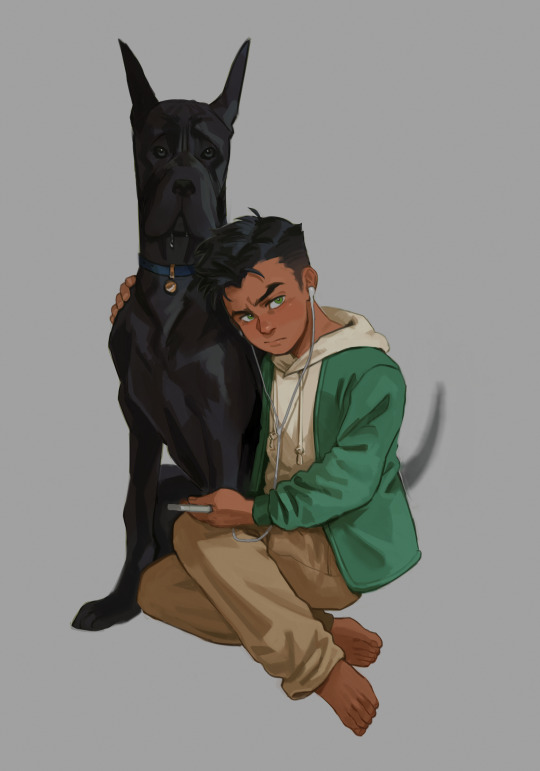
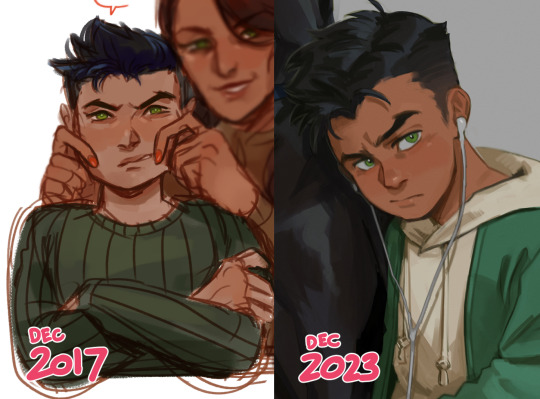
🐣 ok we are so back………..
#damian wayne#batman and robin#batman#dc comics#i just found out damian is still the character i have have drawn the most to this very day 🤡#i just finished replaying arkham asylum#i am playing arkham city#i just spent $81 to finish my B&R n52 collection#when i say we are so back i mean it#but for how long?????????????????#too scared to read the new stuff bc apparently they put damian on trial and sentenced him to character growth DEATH
10K notes
·
View notes
Text
Long and Short Sentences for Impact
Preceding a short sentence with a long sentence can make the short sentence punchier.
'She crushed a rune in her right fore as she dove, and the slew shot with her melted to naught ere light aft light poked into being to link to one another.
'And eye became oped maw thrust fro dust.'
Note the sudden change in sentence length. With added context, such as a previously set expectation, this further conveys the surprise of the narrative point of view, which in this case is the character who crushed the rune.
0 notes
Text

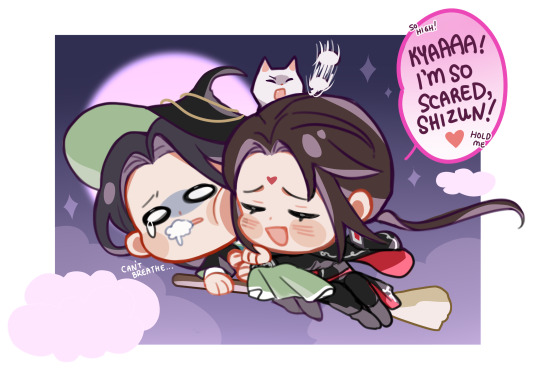
a bingqiu witches x xianxia fusion, as prompted by cass and fulfilled as part of an ongoing fundraising event at svsss gotcha 4 gaza!
#svsss#scum villain#bingqiu#shen qingqiu#luo binghe#shen yuan#mxtx#my art#i wanted to bring viet!binghe out for once#the prompter wanted them to be sitting on xiu ya#but the sword's not long enough to fit two grown men sooo next best thing was to have it tied to the broom lol#the white cat is sj#probably#but i can't decide if he's sy's familiar ORRR#if it was a summoning gone wrong#in which sy was summoned to possess sj's body by someone with Bad Vibes and inadvertently ejected sj's soul into the nearest living thing#which was a nearby white cat#ORRRR we do this sabrina the teenage witch style#and sj was sentenced to live a 100 years as a cat for some atrocity he may or may not have been involved in
2K notes
·
View notes
Text
CHTH217 Essay on the Prophet Rātana and his Theology
CHTH217 Special Topic: Māori Religion and Theology
Tahupōtiki Wiremu Rātana was a prophet prophesied and the fulfilments of the dreams, prayers and prophesies of a century of Māori Christians. Seeing himself as another Moses, in a long line of Māori Prophets come both to deliver the Māori people from the subjugation and oppression of colonial New Zealand, and to liberate his people also from the false gods of idol worship and the degenerated state of tōhungaism which after a century of colonialism had turn to superstitious worship of half remembered medicines and practices with the underlying purposes and science lost in the struggle to preserve it against Pākehā assimilation, becoming a tool keeping Māori sick and ignorant instead of healing them. To these purposes Ratana was called, tested and driven by God to heal his people’s wounds and to rally and lead them, not to a promised land or a return to their ancient home but to the liberation of Aotearoa through Te Tiriti, biblical inspiration and parliamentary process. T.W. Rātana was of the line of Ngāti Apa and Ngāti Raukawa chiefs and of a line of tōhunga leaders, the most recent his aunt, Mere Rikiriki who as his godparent and primary teacher of maramatanga (here meaning spiritual knowledge, tōhungaism and biblical education), Rikiriki represents the whakapapa of his knowledge, Christianity, and ministry as well as of his blood. Through this and through the many prophecies that will be discussed later, Ratana was uniquely positioned in the worlds of Christendom and Māoridom to be a powerful force for change.
On the 8th of November 1918, arriving as a cloud the Holy Ghost came to Ratana, having searched every nation of the world Ratana was chosen to be the mouthpiece of God, the next prophet to his people to heal and bring to peace and the gospel (Henderson, 1972). Ratana was tested, driven to madness and acts of danger and harm, racing through fences and leaping into blackbury bushes (Newman, 2006). He was given a mission to heal and sent with this gift to pass the miracles of God’s healing on to the Māori people. As with the prophets of the bible, this calling was not for his benefit, in the months before this the influenza had more than decimated his family (Newman, 2006) and while his first miracle would be to heal his son, his mission would also see him lose that same son (Henderson, 1972) during his later world tour as a sign of the fulfilment of that side of his calling.
Ratana would become first a faith healer, travelling New Zealand, casting out the remaining Atua and healing those sickened by the influences of the dying Atua and arts of tōhungaism as well as those suffering of the European diseases, polio, Te Mare (TB) and influenza, cancers and the great injuries of the great war. He would later travel to Europe, Japan and America on this purpose to heal the spiritual wounds made to the world by this war as he had healed the physical wounds of his people. Ratana was also called to start a movement and a church, with the aim of political change to heal Māori from the wounds of Pākehā after he had healed them from the wounds of tōhungaism.
By the time of his death in 1939 Ratana had revolutionaries New Zealand, set in place a political alliance that would hold the Māori seats for half a century, delivering recognition of Te Tiriti o Waitangi and many substantial reforms for Māori. He would heal thousands of Māori, and even some Pākehā although he made clear his mission was for Māori and would not go out of his way to heal Pākehā until all Māori were healthy (Henderson, 1972). He would found a Church and build a community that 100 years later is still strong and still works for the benefit, health and liberation of Māori (RNZ, 2018).
Ratana differed from the typical image of prophets and faith healers, shying away from dramatic performances, his healings were matter of fact and often grounded entirely in common medicines, instructing the healed how to take care of themselves, even providing quotes and explanations from Pope’s Health for the Māori an 1884 publication alongside the more miraculous healings unexplainable without consideration of the power of God (Henderson, 1972). During his early stage,
his healing was grounded in fighting back the dark influences and shadows of false healers and tōhungaism, later when this focus was replaced with healing Māori from the consequences of settler rule his manner and style of healing, not great proclamations and showmanship but slowly drawing out his watch or puffing on his pipe while giving the patient a few quiet moments to believe, and try being healed (Henderson, 1972).
Ratana had two missions to heal the Māori people, first the mission spiritual to heal their souls and bodies from both the European diseases and from Tōhungaism (Newman, Ratana revisited : an unfinished legacy, 2006), and the mission political, to restore their lands, get te tiriti recognised and get meaningful representation in politics to carry out meaningful steps towards the liberation of Māori. Much of the Ratana symbolism focuses on these two missions, his sons Arepa and Omeka were personifications of these missions and the passing of Arepa is considered the ending of the first mission, in the successful defeat of Tōhungaism and the passing of Omeka marked the end of the first step towards the second, with the Te Tiriti petition and party body to contest the Māori seats set up. The two whales were beached by the waves in March, 1918 before the vision in his first calling to serve, are seen as representing these twin missions (Henderson, 1972). Through these two missions Ratana was called like the previous Māori prophets to resolve the spiritual and political challenges against Māori in the modern world, but provided with a framework to deal with them separately (Dacker, 1994) and through his spiritual mission, healing and good works build both the legitimacy and respectability needed to fulfil the political and the political base and support to take on the colonial establishment.
Ratana was preceded by many prophecies, that establish his calling and his mission. These follow in the biblical tradition of prophets and link into his role beyond the prophets in his dual missions, echoing the many prophecies that foretold of the New Testament.
In 1886 at korotuaheka, Hipa Te Maiharoa the Moses of Waitaha, healer and prophet of the South Island foretold that “a very little child will come from the north under Taranaki; he will finish my work for Jehovah. (Dacker, 1994, p. 96)” This work was the work of holding on to Māori land, reclaiming soviegnty, fighting tōhukaism (tōhungaism), uniting Waitaha, Kāti Maemoe and Kāti Rākai and uniting the Christian and te ao Māori worlds through the deaths of the Atua and the indigenisation of a Christianity based in the text of the bible from a Māori perspective, not the traditions of European colonialism. (Dacker, 1994)
Te Kooti, himself the fulfilment of the prophecy of Toiroa Ikariki, said in 1893 that a child would arise from the west and unite the people, and in another prophecy that two stars would arise, a statesman from Ngāti Porou in the east and a spiritual leader, a prophet in the west. Te Kooti’s third prophecy foretelling of the coming of Ratana was that “a garden of many flowers shall come forth from out of the mouth of the Whangaehu River, and its fragrance will be dispersed throughout the four winds of the country.” (Newman, Ma te wa: the sign of the broken watch, 2012, p. 3). Three decades early in 1863 the prophet of Ngaphui Aperahama prophesied that “There is a man coming however, who will be carrying two books: the bible and the treaty.” (Henderson, 1972). Through these prophecies we can see the aspects of Ratana as holding the Te Ture Wairua, his spiritual mission in one hand and the Te Ture Tangata, his political and worldly mission to restore Te Tiriti and Māoridom in the other. Through the garden his mission to reach out to all Māori not just his Iwi as did other Māori prophets as well as his political campaign of the four quarters and together with Te Kooti’s other prophecies are confirmation of his location.
Mere Rikiriki, the Māori prophetess of peace, and aunt of T.W. Ratana, herself the heir of Tawhiao of Te Whiti, something she worded as wearing their cloak about her shoulders, prophesied before
Ratana’s birth that there would come a child who will take action directly, lead a great mission without favouritism and who will be more than a man in his attributes. As Ratana grew, Mere Rikiriki saw that man in him, saying that he will wear her cloak of wairua. She repeated this prophecy many times, including to him such as in 1911 when he studied under her (Henderson, 1972) and when she named two of his sons, Arepa and Omeka, and would not touch them as the tapu within them was so great, beyond even that of normal infants, saying that those children were far above her, their name coming from the Son (Jesus) himself (Newman, 2006).
As Te Maiharoa, Te Kooti, Te Ua Haumene, Te Whiti and the other prophets drew together biblical and hapu or Iwi traditions to create a creed of peace, survival and resistance against land being stolen, T.W. Ratana drew together biblical traditions, Christian theology and Māori traditions from across many Iwi and Hapu, to create a creed of political engagement, Māori revival and the reclamation of land long stolen. For this reason, I see T.W. Ratana not as he framed himself, another Māori Moses, but as the first Māori New Testament (NT) prophet, sent not to continue the struggle against occupation but to reform and fundamentally change Māori and Christianity into something greater than the sum of their parts through building on what was already achieved and directly taking the message to the imperial establishment.
We also see through all the prophecies the importance of T.W. Ratana as above the other prophets, foreseen not in one people or by one leader by for a century from prophets of many hapu, iwi and faiths. This aligns again better with the NT narrative than the old, proclaimed and foreseen by many prophets and across many scriptures like Christ and with parallels in imagery to both Christ and the apostles, Ratana was given the mission of being a fisher of men. Ratana broke from the earlier prophets again by drawing more on the New Testament in his works and preaching while the older prophets leant more on the old, often exclusively. Where the apostles worked within the Roman political establishments and systems, took the tools of Rome and used them for Christ, Ratana revived this tradition in using the tools and means of Pākehā, the newspapers, wireless broadcasts and the politicial system to modernise his message and reach the Imperial ears.
Like his contemporary, Sir Āpirana Ngata, Ratana was adamant in his fight against Tōhungaism, however unlike Ngata, Ratana’s work of healing, ministry and spiritual leadership drew upon the traditions and knowledge of Tōhunga (Newman, 2006), he regarded this not as a contradiction as despite what his followers kept trying to claim, his healing and work did not have it’s source in his power, his personal mana or his mana tipuna, but God (Henderson, 1972). Likewise he was challenged in his lifetime with claims that his title Mangai, or Mouthpiece of God was putting himself in the godhead or claiming heretical power, however pre-contact the term was used for any who spoke the words of the atua, not for those who claimed an atua’s power or to speak for them (Henderson, 1972), and so we can see that from a te ao Māori perspective this title is no more grandising or heretical than the any Christian who speaks the words of God with any authority, be they layman, priest or scholar. Opposition to this title was not rooted in Ratana breaking with the Christian tradition, but the Pākehā self-appointed guardians of that tradition lacking the familiarity of te reo and te ao Māori to understand the connotations.
Another proposed claim of breach with the Christian tradition proposed by Pākehā opposition to Ratana has been his acknowledgement of both himself as Mangai and the Faithful Angels as intermediaries between the Morehu and God as the same as worshiping angels or Prophets instead of God. This claim of idoltry is made unlikely through Ratana’s long war against idols in his te ture Wairua, locking away the old gods in the ‘whare Māori’ (Henderson, 1972), however the word the mangai used, in English to describe this relationship is intermediary (McDonald, 1990), the same
term used by European Christians for anyone who prayers for another, for the Saints and for figures such as a Pope or bishops who lift up the prayers of others to greater attention. It is reasonable to put this either down to a double standard or to a lack of familiarity with, and suspicion born of prejudiced against te ao Māori perspectives within Ratana’s approach to in this case, fairly orthodox Christian practices of acknowledging Angels, Saints and intermediaries.
Through his building on the previous prophets, the legitimacy and prophecies they foretold of him and the tutoring of Mere Rikiriki and his chiefly and tōhunga lineage combining with his western education and bible study from Methodist, Anglican, Welseyian and Presbyterian perspectives throughout his early life, education and publications available allowing an approach to his ministry grounded as much in the New Testament and theology Pākehā society understands as in authentic te ao Māori beliefs both Christian and pre-contact. Through this T.W. Ratana was successfully able to synthesie Christianity into te ao Māori, by Māori for Māori without losing the tolerance of the Pākehā establishment to create a movement capable of winning momentum and driving last political change for Māori in its lifetime, a key force in all Māori revival since and a strong movement, over 40,000 strong today (McDonald, 1990) without ever having to compromise on its commit and promises either to Māori or to God.
Bibliography
Dacker, B. (1994). Te Maemae me te Aroha; The Pain and the Love. Dunedin: University of Otago Press.
Henderson, J. (1972). Ratana: The Man, The Church, The Political Movement. Wellington: A.H. & A.W. Reed LTD.
McDonald, M. (Director). (1990). Pounamu - Tahupotiki Wiremu Ratana [Motion Picture].
Newman, K. (2006). Ratana revisited : an unfinished legacy. Auckland: Reed.
Newman, K. (2012). Ma te wa: the sign of the broken watch. Mana Maori + Christianity, 3.
RNZ. (2018, Novemeber 8). RNZ. Retrieved from Youtube: https://www.youtube.com/watch?v=UNAwptZQCz
#CHTH217 Special Topic: Māori Religion and Theology#Theology#Māori Christian Theology#Rātana#University Essay#Indigenous Theology#New Zealand Christianity#New Zealand Church History#New Zealand Christian History#History in New Zealand#History and Theology#2nd year#CHTH217#I think this got an A-#The grammar and editing are bad#long sentences#etc
1 note
·
View note
Text
Okay yes we know that Andrew sprinted, dashed, HURTLED even, when he saw Neil on his knees even after blocking 150 + attempts on his goal because he loves that man. But also-
It had been Andrew’s idea to put Neil against Riko in the first place.
For Andrew it was reach Riko or die. (Die knowing that his contributing to exy ended Neil’s life.)
#How long do you think it took for his hands to stop shaking after#how many aborted sentences and possible plays die on his tongue after that#aftg#andrew minyard#kevin day#neil josten#kandreil#the sunshine court#tsc#jeremy knox#jean moreau#jerejean#don’t look at me#DON’T
580 notes
·
View notes
Text
My toxic trait is that I WILL be bucking up into you even when you’re only grinding & cockwarming just so I can hear you let out that pathetic slutty whimper and feel you squeeze around me in protest.
#blxxdyivory#blxxdy.txt#blxxdy.q#fuck punctuation i like long sentences anyways#bd/sm dom#bd/sm relationship#bd/sm breeding#nsft concept#cnc free use#cnc k!nk#cnc fr33use
672 notes
·
View notes
Text
*cracks open google docs and it releases a cloud of dust*
#i havent written in so long what if i do it wrong (insane)#u dont understand i havent written for like. two years straight#like a few sentences here and there. nothing concrete#i should stop procrastinating on tumblr and just write the thing#talking tag#writing#writing memes#writing problems#writer memes#writer problems#look upon my posts boy
3K notes
·
View notes
Text
too many of you guys think nico is the loser and not lewis for letting the divorce go on for so long. like they're both losers about each other. emotionally constipated idiots who can't talk about their toxic homoerotic friendship that imploded on itself like 8 years ago and are now making it everyone else's problem. yeah nico's on television or in beer gardens talking about lewis all the time but like every other month some reporter is like "lewis, what's your favorite moment in your career?" and lewis no hesitation is like "oh man, karting, y'know? everything was simpler then" and then spends another six months skirting around nico's name. like this whole thing they're doing in the media isn't some kinda extended foreplay for them. they're both still pressing on the bruise to make sure it's still there!!! every few months, they're literally just asking on public television, does it still hurt for you like it does for me? and like clockwork, someone will release new information about them or one of them will say something about each other (in my heart, he's still my best friend/yes... and teammate) and the answer will remain the same, yes, of course, always.
#lewis is unarguably more famous than nico. like i feel like this a fact. and yet every other day nico is in the press saying some crazy shit#about lewis. if i was famous i woulda shut that shit down soo long ago. my ex-bf is in the press talkin bout me constantly??? that feels#like such bad pr and yet!!! lewis has not done anything. why? cause he likes it!!! cause they've never moved on from the 1st moment they#broke each other's hearts. like this is genuinely insane.#im always so nervous to post my thoughts on brocedes cause so many of you were here b4 me and have a better understanding on them#and like being a wrong is like a death sentence to me but still please tell me if i got them completely wrong#i have a lot of thoughts on lewis and his reluctance to talk about nico... most of them being that one quote from emma#if i loved you less i might be able to talk about it more#ok obligatory disclaimer: a lot of this is hyperbole. i don't think that they're asking lewis that ? every other month#but there are like at least 5 interviews where he talks about karting like they're his most precious memories#so make of that what you will#and obv i don't know these people but as someone who's brain chemistry has been permanently changed by them#i think i'm allowed to not only project onto them but also make stupid little posts analyzing them#anyway yeah#f1#lewis hamilton#nico rosberg#brocedes
609 notes
·
View notes
Text
Not to pretend that Death Note is deep but Death Note The Musical 2015 Urai Kenji with english subtitles is deep actually and I love their thesis on what Death Note is about
Like every adaptation is also inherently a thesis on the source material since the question "how can we express this in a different medium" cannot be answered without knowing what the original material is supposed to express in the first place. Or at least what it should express depending on how much they change it, but Death Note The Musical is a very faithful adaptation and follows the original almost step by step except for the fact that it ends sooner, has songs, and cuts a few parts off to fit the limited time, so I'm gonna go with the first one
And their thesis is that Death Note is about love. Specifically, all-consuming love, in its ugliest and in its most beautiful. It's not about genius deductions or the lawlight pissing contest or even about the most obvious moral and political discussion on criminality and punishment (thank god, because Death Note doesn't do that right at all). It's about a web of profound, deep, all-consuming loves. Misa's love for Light. Rem's love for Misa. Light and L's weird love for each other (which is pretty much canon in the musical, see: tennis duet). Love at its most unhealthy, selfish, and self-denying (lawlight) versus at its most selfless, beautiful, and fulfilling (remisa)
The driving force of the entire plot is love - except for Ryuk, who is driven simply by boredom, and is always shown obviously out of place in literally every scene. Light and L deny it, and love in a selfish way - they want to consume each other, become one, annihilate the other. Misa and Rem love selflessly - they want to make their loved one happy. And that is the ultimate difference between them, that defines their trajectories and their end
In a canon where the protagonist calls himself a god, the one to have the heavy religious imagery place unto them is Misa. Specifically, Misa after sacrificing everything for love, Misa after singing that the value of a life is defined by how much you love, that life is fleeting but love is what stays. Misa is ascended in that moment, so much so that a real goddess worships her at her feet, happily choosing to give her own life for Misa. And that proves Misa right, because in that moment, love does kill death - metaphorically and literally
(Meanwhile, the protagonist who sings about sacrifice dies pointlessly and sadly, after killing his own love. And he does so, again, literally and metaphorically. Literally because he killed the one he was in love with, metaphorically because he chose violence and greed and abandoned and deceived the ones he loved the most - Sayu and Soichiro - before it all. So when I say love, I'm not talking only about romantic love, even though I know that's the form of love Misa is singing about)
And that makes Death Note a proper tragedy and at the same time not at all like one, because Rem is happy, and so is Misa, despite having nothing left. It is L and Light, who wanted everything, who die unhappy and empty. So it's also about greed, but that greed is also shown through the way they love - consuming in the worst way, meaning taking the other and annihilating them into you, consuming them, taking them for yourself. It's an interesting take in how love as deep as Rem's for Misa and Misa's for Light can be ugly and twisted, and not at all romantic
And it's not at all the take I expected them to have from Death Note but damn I'm glad it was
#death note#death note the musical#lawlight#remisa#light yagami#l lawliet#misa amane#rem#im insane can you tell#long post#no tldr#complex language#long paragraphs#long sentences#meta#losing it a little bit
371 notes
·
View notes
Text
Something I really appreciate about TOA that I don’t see get talked about much is that I never get the sense that Apollo finds Lester ugly.
For all that he complains about the body he’s stuck in, I never got the feeling that it came from a distaste for Lester himself. When he sees Lester’s traits reflected in others, like Meg being chunky, he is completely unaffected by it. Finds it charming, even. (In fact, the only times I can remember him having Opinions about how someone looks is when they’ve chosen something about their appearance that he either approves or disapproves of, like a tacky jacket/hair cut or when he finds someone attractive. The only time I can remember him calling anybody ugly was when he pointed out that Dionysus was choosing to look as ugly as possible to piss of Zeus, which is a statement of fact and doesn’t necessarily mean he thinks that Dionysus’ form is actually ugly. He makes no mention of finding it so before or after that line. It’s a statement of fact that Dionysus is choosing a form that either he or Zeus finds ugly to piss of their dad.)
The thing about Lester is that he is so devastatingly mortal. He has flab and acne and no upper body strength and his voice squeaks when he’s nervous and he sweats a lot and he has a silly name and messy, curly hair that’s impossible to tame. He is the Most Teenager To Ever. There is no godly blood running through his veins, no powers he can call upon. If Apollo were to run into him in the street, I don’t think he’d pay him much mind. He’d probably just think, “sweet kid”, and move on. If he got to know him, I think Apollo would adore him because that’s just who rrverse!Apollo is. He loves mortals despite himself, flaws and all. He’d argue against anything bad Lester had to say about his own appearance and mean every word.
The problem is that it’s Apollo in this body. Apollo, The Golden Child, the perfect son, a God. His distaste for this body is because Lester is so devastatingly mortal and imperfect. Apollo has to be perfect, he has to be shiny and pretty and strong because he has nothing else to offer otherwise.
And.. I dunno, there’s something about Apollo hating the things that draw him to others when it’s him. The flaws that he tears apart in himself he finds endlessly charming on others, or he thinks that they have better reasons for why they have them, or he thinks they have enough positive traits to counteract them. The positive things that he hides deep enough that even the reader can’t see right away, like his kindness and genuine desire to understand and connect with everyone around him, that he’s shocked to find directed at him in turn.
That Apollo accepting himself and reclaiming his personhood leads to him being comfortable with being Lester, imperfect and mortal as he is. That he takes that imperfection back with him to Olympus… I dunno man I’m Emotional. Also it’s just plain nice that Lester is never treated as ugly for looking like a normal ass teenager, even by the guy stuck in this body. That’s neat.
Or maybe I’m just rambling and this means nothing at all and I’m reading too far into Blorbo from my books.
#DOES THIS MAKE SENSE. is this too rambly. AUGH.#words machine ALWAYS broke and I forget everything I’m trying to say the moment I try to write or type it out#which results in long ass posts like this. this could’ve been 3 sentences probably#TOA#trials of Apollo#rrverse!apollo#lester papadopoulos#snack time#should I tag this as meta?? I dunno
655 notes
·
View notes
Text
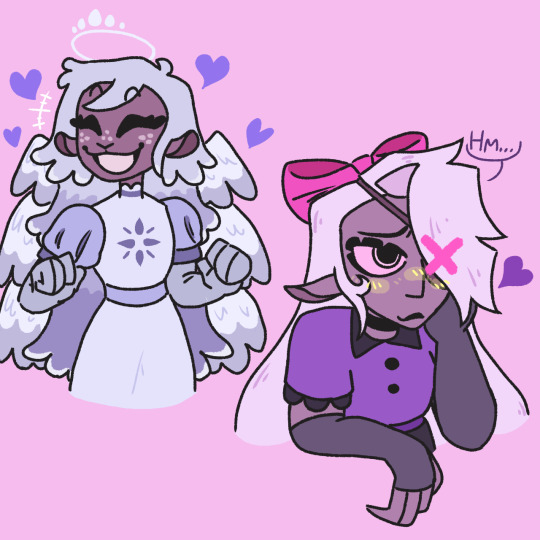
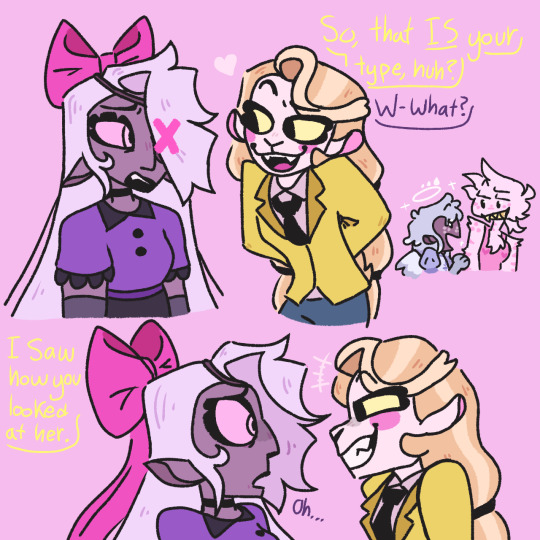
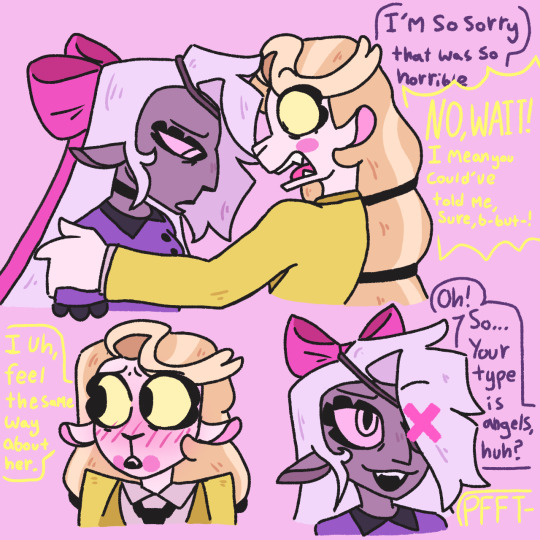
Bonus under cut vvv
Later that same day:
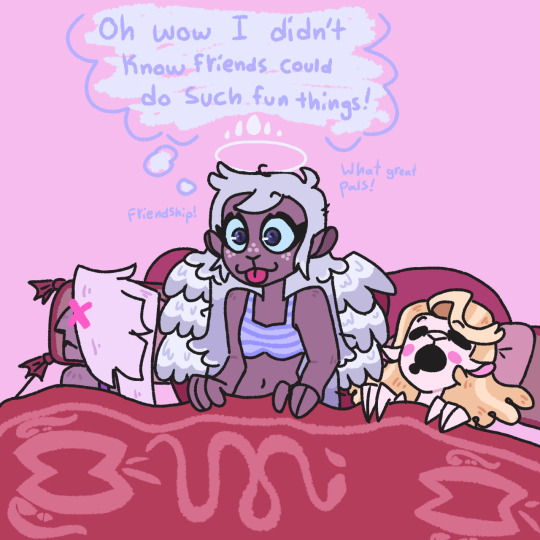
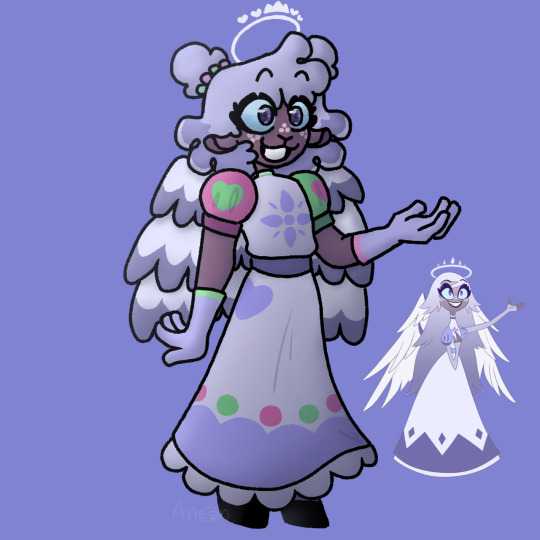
And... I made an Emily redesign too...... *sniff sob /j* it's not final (like all my redesigns) I'm just trying get better at this design stuff and where better to do it except my current fixation ehhh?????
Long Emily design explanation/rant thing ignore it probably but pls dotn im desperate: I wanted to make her more round and soft cuzzz I love those typa designs I'm just a sucker for circle characters. Made her actually black and not fuckin gray cuz its a transformation to look more human and gentle(for me they go between two forms, their true ones that we see the first time we see them snd their human/softer ones if they ever interact with actual humans which... they usually dont.) Not a demon form tfff. In this version I wanted to put Emily in animal inspired features like... the sheep nose, ears, and hooves. Because she and Sera know that humans and about all beings love animals. Birds have sharp features mostly so they don't look as welcoming as they want to seem. I wanted Emily to look sheep likes and pretty much all the seraphim look more sheep like to make Lucifer stand out as the only one who was symbolized as a snake/goat(still don't know if I'll make him goat or make Lillith goat. I'll decide when I get there lmao). Justtt overalll wanted Emily to look more round, welcoming, and cute. I kept the freckles lighter than her skin color(even tho that's SUPER not accurate to what actually black people look like with freckles but whatevr) because it reminded me of fawns and.... sure Emily is a sheep but I still wanted to incorporate other cute animal traits with her cyz y not.
#suggestive#ig???#tw suggestive#art#fanart#digital art#artists on tumblr#hazbin hotel#hazbin hotel charlie#hazbin hotel vaggie#hazbin hotel emily#chaggie#chaggily#two and a half halos#unholy trinity#the chaggilu shipnames arent ass but unholy trinity isnt solely them snd taahh is too long#so ive come up with somrthing new and has nothing rlly in the tag alrady#why that name? because 1. Charlie is pure but is the princess of hell. 2. Vaggie “betrayed” heaven for giving mercy to a child.#3. Emily is still an angel who went against heaven to speak up for the people of hell being exterminated#they are all just soo pure snd deserve the worlldd i swearr.... but to other peoples eyes(atleast soem) they arent good ppl and omgg 😭#plsss dont sleep on this ship name i came up with it in 5 seconds so i worked soooooooooooooOoo hard on it /sarc#but srsly plssssss use iyttt#rainbowmoth#varlie#royalhalo#charlie x emily#charlie x vaggie#emily x vaggie#THATS THE NAME THATS SUPPSED TO BE BETWEEN THE OTHER SENTENCES BUT IM NOY GONNA REWRITE THEM CUZ IM LAZY#unholy virtue
649 notes
·
View notes
Text
❥ 𝐋𝐘𝐑𝐈𝐂𝐒 𝐅𝐎𝐑 𝐔𝐍𝐂𝐎𝐍𝐕𝐄𝐍𝐓𝐈𝐎𝐍𝐀𝐋 𝐒𝐇𝐈𝐏 𝐃𝐘𝐍𝐀𝐌𝐈𝐂𝐒 [ 𝚂𝙴𝙽𝚃𝙴𝙽𝙲𝙴 𝚂𝚃𝙰𝚁𝚃𝙴𝚁𝚂 ] .
designed for ships, but can be used for a variety of relationship types. change gendered language/add context to your needs. happy roleplaying !! ♡
❛ it feels so good to be bad. ❜
❛ it really makes me wonder if i ever gave a fuck about you. ❜
❛ give me something to believe in. ❜
❛ i don’t believe in you anymore. ❜
❛ i wonder if it even makes a difference to try. ❜
❛ so, this is goodbye. ❜
❛ one day i’ll wake up & it won’t hurt anymore. ❜
❛ it’s like i can’t even feel after the way you touched me. ❜
❛ you’re everything that i want, but you don’t want me. ❜
❛ am i a regret, yet? ❜
❛ was it worth what it costed? ❜
❛ you make me nauseous. ❜
❛ you’re overrated. ❜
❛ when i think of you, i just want to throw up. ❜
❛ all my friends say that you’re toxic. ❜
❛ why does love suck? ❜
❛ love hurts whether it’s right or wrong. ❜
❛ i can’t stop, i’m having too much fun. ❜
❛ you can’t save me, baby. ❜
❛ you never call or listen to me anyway. ❜
❛ where were you tuesday, october tenth? ❜
❛ how is your jacket covered in blood? ❜
❛ how was the party? did you have fun? ❜
❛ i fell in love with the warning signs. ❜
❛ the only time i feel alive is when i’m touching the warning signs. ❜
❛ if you tell me to stay away, i’m gonna dive in again. ❜
❛ my favorite color is red like the flags you fly overhead. ❜
❛ well, i should have known. ❜
❛ didn’t you see it coming? didn’t you see the signs? ❜
❛ i’ll break your pretty face. ❜
❛ bite your tongue & choke yourself to sleep. ❜
❛ you can hold my hand if no one’s home. ❜
❛ do you like it when i’m away? ❜
❛ you’re a pond & i’m an ocean. ❜
❛ all my emotions feel like explosions when you are around. ❜
❛ i am a wreck when i’m without you. ❜
❛ was it something i said to make you feel like you’re a burden? ❜
❛ tell me, is it worth it? ❜
❛ she’s a lady & i am just a line without a hook. ❜
❛ do what you want as long as you stay here. ❜
❛ you’ll change your name or change your mind & leave this fucked up place behind, but i’ll know. ❜
❛ if you ever try to leave me, i’ll find you, [name]. ❜
❛ i’ll be the bad guy, now. ❜
❛ i couldn’t be there, even when i tried. ❜
❛ seasons changed & our love went cold. ❜
❛ i knew that this was doomed from the get-go. ❜
❛ you thought that it was special, but it was just the sex, though. ❜
❛ it’s only me; what have you got to lose? ❜
❛ you should take it as a compliment that i got drunk & made fun of the way you talk. ❜
❛ you should think about the consequence of your magnetic field being a little too strong. ❜
❛ you’re so cool, it makes me hate you so much. ❜
❛ you’ve ruined my life by not being mine. ❜
❛ you’re so gorgeous, i can’t say anything to your face. ’cause look at your face. ❜
❛ i’m so furious at you for making me feel this way. ❜
❛ if you’ve got a girlfriend, i’m jealous of her. but if you’re single, that’s honestly worse. ❜
❛ you’re so gorgeous, it actually hurts. ❜
❛ you make me so happy, it turns back to sad. ❜
❛ there’s nothing i hate more than what i can’t have. ❜
❛ guess i’ll just stumble on home to my cats. alone … unless you wanna come along? ❜
❛ you look so happy when i’m not with you. ❜
❛ i don’t know why i run away. ❜
❛ take me back, ’cause i wanna stay. ❜
❛ i kept my distance ’cause i know that you don’t like when i’m with somebody else. ❜
❛ i couldn’t help it; i put you through hell. ❜
❛ i realize that it’s much too late, & you deserve someone better. ❜
❛ i’m not the best at breaking up. ❜
❛ i like my alone time, but i want somebody to hold. ❜
❛ i get what i want. i keep it for a minute. then i let it go. ❜
❛ i hate it when you’re there for me, but i like it when you hit the spot. ❜
❛ i don’t do fake love, but i’ll take some from you tonight. ❜
❛ i don’t expect you to understand. ❜
❛ i’m ready to die holding your hand. ❜
❛ i can’t hide how i feel about you inside. ❜
❛ i’d give everything up tonight, if i could just have you be mine. ❜
❛ i’d give up everything for you. ❜
#sentence starters#sentence meme#rp starters#rp meme#rp prompts#roleplay meme#roleplay starters#roleplay prompts#small text is no longer a thing on this blog bc tumblr makes it impossible to format long lists like this with the stupid#character limit rule so enjoy this normal sized text <3
434 notes
·
View notes
Text


the "walking into a new area" experience
#doodle#fanart#chants of sennaar#chants of sennaar spoilers#the traveler#HI THIS IS A FANART PIECE. THATS HOW YOU KNOW IM OBSESSED#i handled the first two areas fine but like. this one. good god#fucking nothing is clicking lmao the sentences are too LONG#but this game is so fun its sososososo fun omg play it i love it#the characters are so CUUUUUUTE#agh#ok#back in the pit
492 notes
·
View notes
Text
Hnnnghg I kinda want to draw more of the Achilles and Priam comic and continue it
731 notes
·
View notes